Overview
Becoming an electrician offers a stable, well-paying career that blends hands-on work with technical know-how. In this comprehensive guide, we’ll cover everything—from electrician qualifications and education requirements to salary and job outlook, essential tools, safety best practices, specializations, continuing education, real-world success stories, and even starting your own electrical business.
Whether you’re asking “how to become an electrician?”, “What degree does an electrician need?”, or “what does it take to be an electrician?” This article walks you through every step, step by step, in simple, humanized English, fully optimized for SEO.
Why Choose a Career as an Electrician?
Electricians are in high demand across residential, commercial, and industrial sectors. Choosing this path means:
- Job security & stability: Electrical work is essential in every new building or renovation needs wiring.
- Competitive wages: Journeyman electricians average $50–70K/year; masters earn even more.
- Career growth: Progress from apprentice to master, supervisor, or entrepreneur.
- Variety of work: Offices, homes, factories, renewable energy sites.
- Immediate satisfaction: Troubleshoot a live circuit, restore power, and see instant results.
Whether you’re just starting or asking, “I want to become an electrician,” this career offers growth and stability.
What Does It Take to Be an Electrician?
Being an electrician goes beyond flipping switches. You need:
- Physical fitness: Climbing ladders, bending conduit, lifting materials.
- Attention to detail: One misplaced wire can cause dangerous malfunctions.
- Problem-solving: Diagnosing faults in complex circuits.
- Safety mindset: Working safely around live electricity and heavy equipment.
- Math aptitude: Calculating voltages, loads, and conduit bending angles.
This section answers “what do you need to know to be an electrician”, preparing you mentally for the journey.
Education & Qualification Requirements
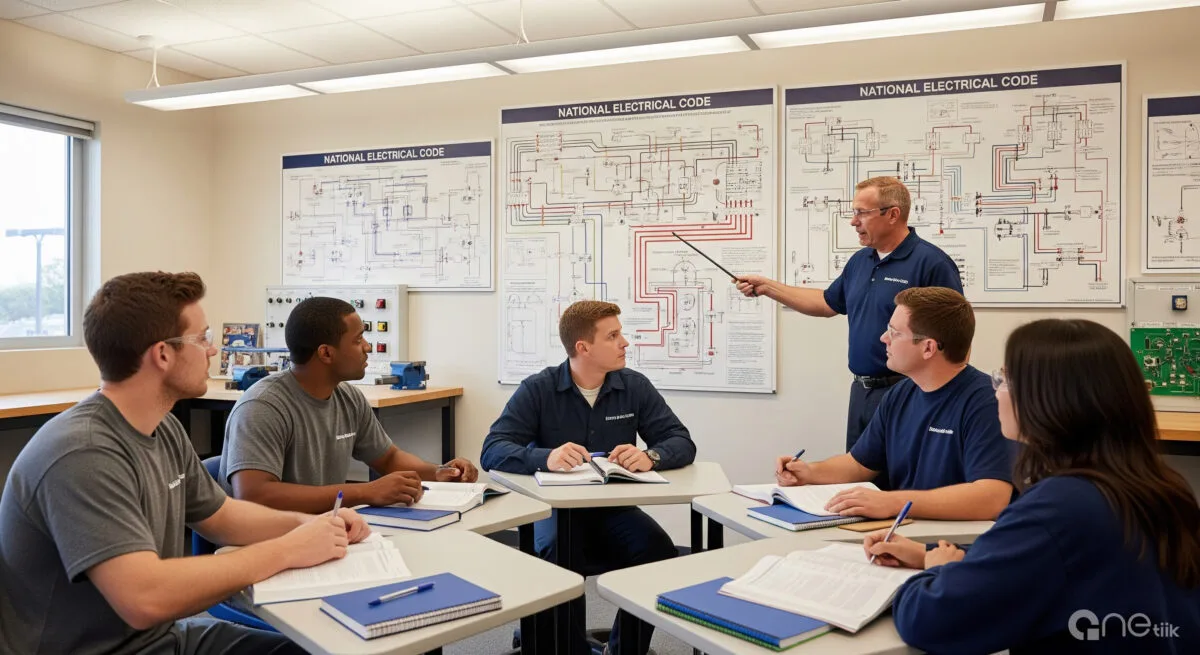
High School Diploma or Equivalent
A high school diploma or GED is the first requirement to become an electrician. Key coursework includes:
- Mathematics (algebra, geometry)
- Physics or basic electrical principles
- Shop or vocational classes
This foundation ensures you can handle technical concepts in later training.
Technical Schools & Community Colleges
Many aspiring electricians enroll in certificate or associate degree programs. Look for:
- Electrician training requirements programs
- Courses in electrical theory, blueprint reading, and safety codes
- Hands-on labs with real wiring projects
An associate’s degree can count towards your apprenticeship hours, speeding up certification.
What Degree Does an Electrician Need?
- Certificate/Diploma: 6 months – 1 year; covers basics, good for entry-level work.
- Associate of Applied Science (AAS): 2 years; in-depth theory plus labs.
- Bachelor’s degree: Rarely required unless moving into engineering or management.
Most journeyman electricians hold a diploma or associate’s degree.
Becoming an electrician takes smart learning. Master hands-on skills and improve focus with these proven study tips.
Electrician Training Requirements

Apprenticeship Programs
An apprenticeship combines paid on-the-job training with classroom instruction. Typical details:
- Duration: 4–5 years
- On-the-job hours: ~8,000
- Classroom hours: 500–1,000
- Content: Residential, commercial, industrial wiring; code compliance; safety.
To join:
- Meet basic requirements (age 18+, high school diploma, driver’s license).
- Apply through union (e.g., IBEW) or non-union programs (e.g., NECA).
- Interview and acceptance.
On-the-Job Training

As an apprentice, you’ll learn:
- How to pull and run wire
- Install conduits and fixtures
- Read and interpret blueprints
- Test circuits and troubleshoot
Mentors supervise your progress, ensuring you meet the electrician training requirements.
Classroom Instruction & Certifications
Classroom hours cover:
- National Electrical Code (NEC)
- Electrical theory
- Safety standards (OSHA)
- Specialized systems (low voltage, solar)
Certificates you may earn:
- OSHA 10- or 30-hour
- First aid/CPR
- Specialized: solar PV, EV charger installation
Steps to Becoming an Electrician
- Research the career: Understand job duties, salary, and pathways.
- Complete high school/GED: Focus on math, physics, and vocational courses.
- Enroll in technical training: Certificate or associate degree.
- Apply for an apprenticeship: Union or non-union.
- Complete on-the-job hours: Gain hands-on experience.
- Finish classroom instruction: Meet required theory hours.
- Pass journeyman exam: Demonstrate knowledge of NEC and practical skills.
- Obtain license: Varies by state, journeyman, then master electrician.
- Continue education: Stay current with code updates and new technologies.
This process of becoming an electrician ensures you meet all requirements to become an electrician and can work safely and legally.
Salary & Job Outlook
- Median salary (2024): $58,000/year for journeymen; masters average $80,000+.
- Regional variations: Higher pay in metropolitan and high-cost areas.
- Projected growth: 7% increase through 2032—faster than average for all occupations.
- Overtime & specialty pay: Emergency call-outs and solar/EV installations can boost earnings.
Essential Tools & Equipment Checklist
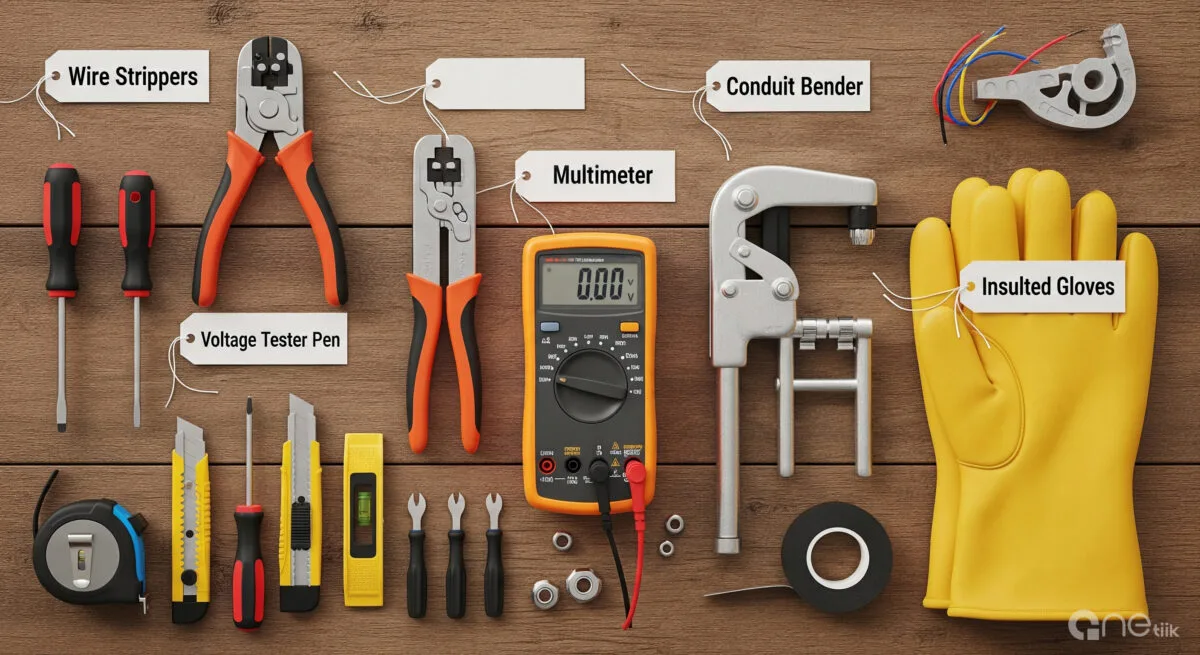
| Tool Category | Examples | Notes |
|---|---|---|
| Hand Tools | Wire strippers, pliers, screwdrivers, utility knife | Invest in quality brands |
| Power Tools | Cordless drill, hole saw, conduit bender | BATTERY-powered for convenience |
| Testing Devices | Multimeter, voltage tester, clamp meter | Essential for troubleshooting |
| Conduit Tools | Pipe reamer, ratchet bender | For metal and PVC conduit |
| PPE | Insulated gloves, safety glasses, hard hat | Mandatory on most jobsites |
| Specialty | Fish tape, label maker, cable puller | Speeds up complex installs |
How to Get Started as an Electrician
- Contact local trade schools for programs in your area.
- Reach out to union halls (IBEW) or NECA for apprenticeship openings.
- Network with electricians and contractors.
- Volunteer for small wiring jobs or DIY projects to build confidence.
- Attend job fairs focused on skilled trades.
By taking these initial actions, you’ll soon be on your way to how to start being an electrician.
Requirements to Become an Electrician
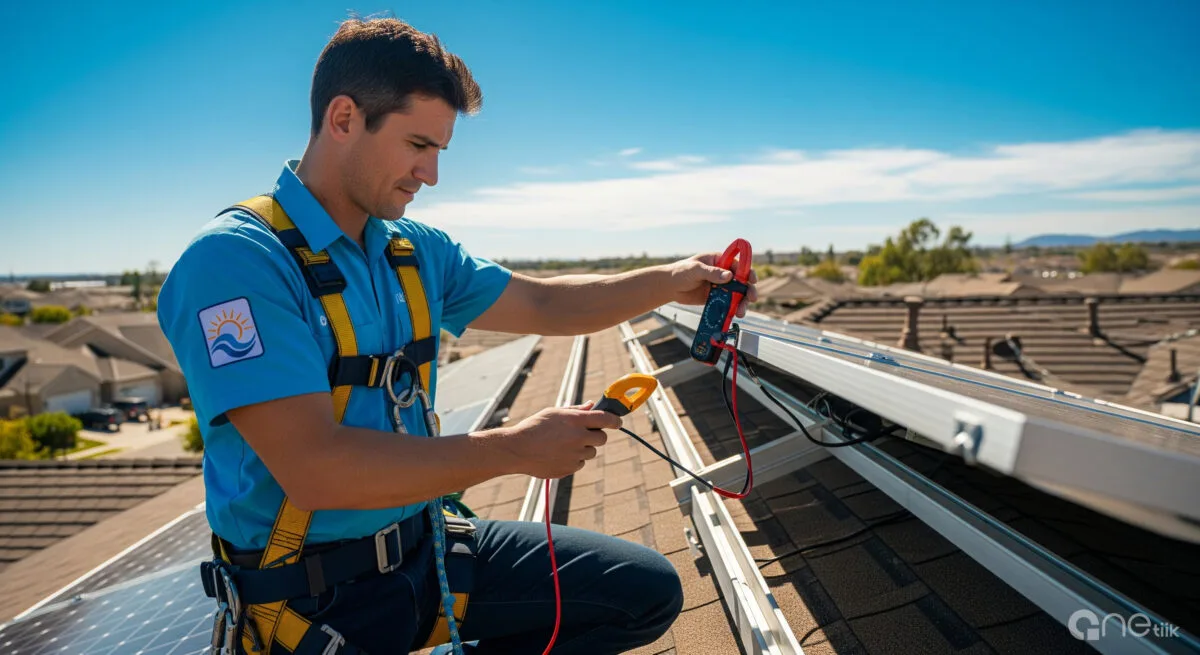
Before you embark, make sure you fulfill:
- Age & education: 18+ with diploma/GED
- Driver’s license: Many apprenticeships require it
- Physical exam: Some programs mandate a health check
- Background check: Common for union apprenticeships
- Basic hand tools: Pliers, wire strippers, screwdrivers
Meeting these requirements to become an electrician prevents delays once you apply.
Safety Best Practices & Compliance
- OSHA Regulations: Know fall protection, lock-out/tag-out procedures, and electrical safety standards.
- Common Hazards: Arc flash, live wires, confined spaces—always use correct PPE.
- Routine Safety Inspections: Check tools for damage, test GFCI outlets, and verify grounding.
- Jobsite Checklist: Review permits, confirm load calculations, secure work area.
Specializations & Career Paths
- Residential Electrician: Homes, apartments—wiring, lighting, service panels.
- Commercial Electrician: Office buildings, shops—larger circuits, HVAC, fire alarms.
- Industrial Electrician: Factories—motors, programmable logic controllers (PLCs), high-voltage systems.
- Renewable Energy: Solar PV, wind turbines—design and install green systems.
- EV Charger Installation: Rapid growth as electric vehicles proliferate.
- Control Systems: PLC programming, automation in manufacturing.
Continuing Education & Certifications
- Code-Update Courses: NEC revisions every three years.
- OSHA 10/30-Hour Training: Workplace safety credentials.
- Specialty Certs: Solar PV (NABCEP), EV charging, fiber optics.
- Continuing Education Units (CEUs): Required for license renewal in many states.
- Online Learning: Theory modules accessible remotely; in-person labs still necessary.
Real-World Case Studies & Success Stories

Case Study: From Apprentice to Master
“I started my IBEW apprenticeship at 19 with no prior experience. By 24, I passed my journeyman exam and landed a full-time role at a commercial contractor. At 29, I earned my master electrician license and launched my own company in solar installs.”
Day in the Life
- 7:00 AM: Review blueprints on site.
- 8:00 AM: Pull wire and set junction boxes.
- 10:30 AM: Troubleshoot a blown circuit in an office building.
- 12:00 PM: Lunch & code-update podcast.
- 1:00 PM: Mentor apprentices on conduit bending.
- 4:30 PM: Final safety inspection with project manager.
Entrepreneurship & Running Your Own Business
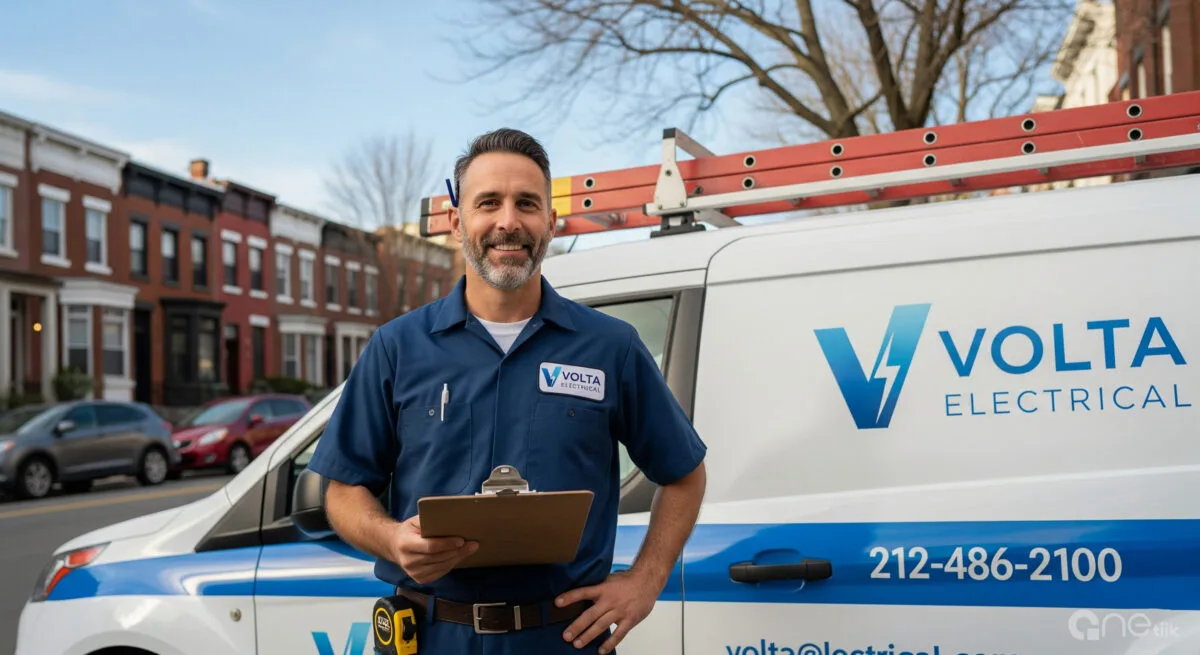
- Business Planning: Define services, target market, and startup costs.
- Licensing & Insurance: Contractor’s license, liability, and workers’ comp.
- Branding & Marketing: Website, social media, local ads.
- Estimating & Bidding: Accurate take-offs, competitive pricing.
- Client Relationships: Clear contracts, communication, and timely invoicing.
- Scaling Up: Hire apprentices, invest in fleet vehicles, expand specialties.
Path to Becoming an Electrician: Flowchart
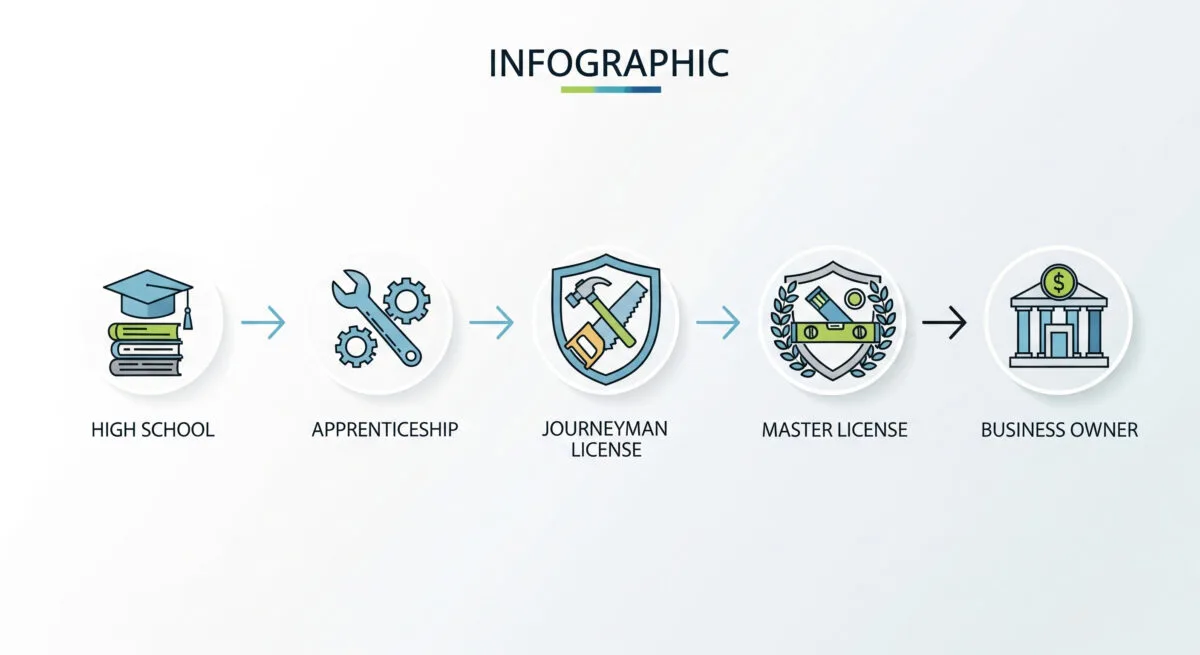
High School Diploma/GED
↓
Technical Training (Certificate/AAS)
↓
Apprenticeship Application
↓
On-the-Job Training + Classroom Hours
↓
Journeyman Exam & License
↓
Work as a Journeyman (2-4 years)
↓
Master Electrician Exam & License
↓
(Optional) Start Your Own Business
This path to becoming an electrician highlights each milestone in clear sequence.
How to Get Certified to Be an Electrician
- Complete apprenticeship: Required hours logged.
- Apply for journeyman license: Submit work hours and school transcripts.
- Study the National Electrical Code (NEC): Focus on local amendments.
- Pass the journeyman exam: Written test + practical assessment.
- Renew your license: Every 1–3 years, it often requires continuing education.
For advanced roles, earn master electrician status by accumulating additional hours and passing a tougher exam.
Best Way to Become an Electrician & Tips
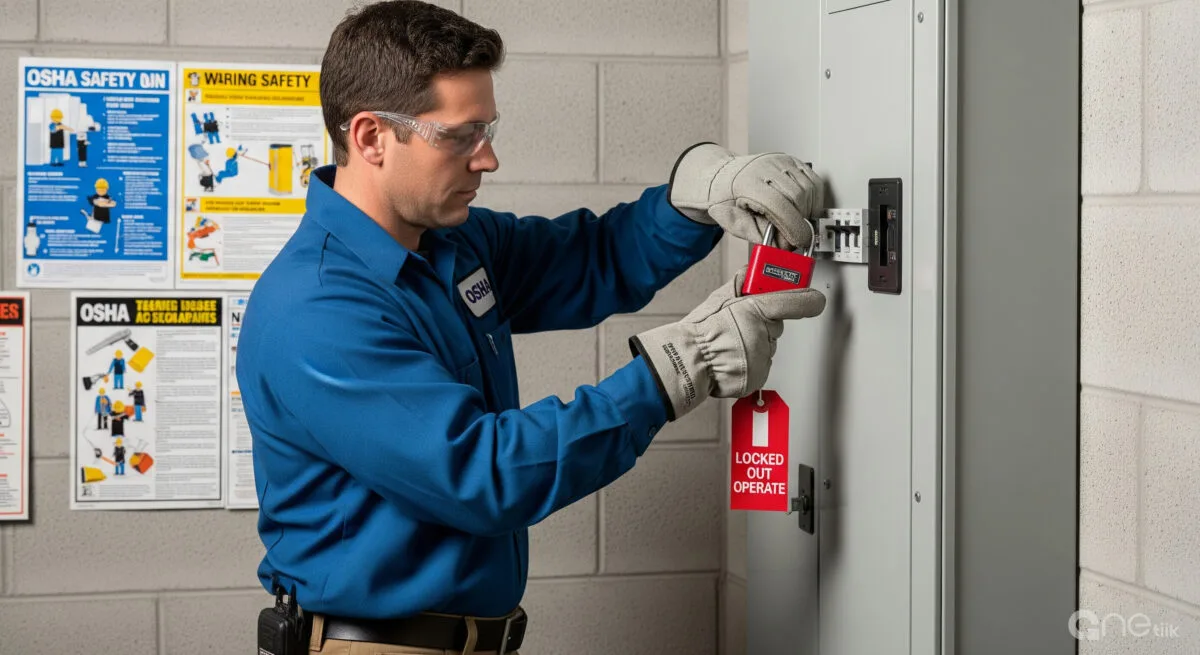
- Choose a reputable apprenticeship: Union programs often offer better pay and benefits; non-union programs can be faster.
- Keep a training log: Document your hours to avoid disputes.
- Invest in quality tools: They last longer and improve your work.
- Network early: Good relationships lead to job offers.
- Stay current: Take code update classes annually.
- Specialize: Consider EV chargers, solar PV, or industrial controls for higher pay.
Following these best ways to become an electrician tips accelerates your progress and opens more opportunities.
Where to Become an Electrician: Schools & Programs
- Community Colleges: Often the most affordable route for an AAS degree.
- Trade Schools: Focused, shorter certificate programs.
- Union Apprenticeships (IBEW): Top-tier benefits, structured.
- Non-Union Apprenticeships (NECA, ABC): More flexible, sometimes faster.
- Online Programs: Theory courses you can complete remotely (lab still required in person).
Check with your state licensing board for approved schools and where to become an electrician near you.
FAQs
What education is required to be an electrician?
At a minimum, a high school diploma or GED with coursework in math and science. Most electricians complete a technical certificate or an AAS degree.
How long does it take to become an electrician?
Typically 4–5 years including apprenticeship hours and classroom training.
What degree does an electrician need?
Most hold a certificate or associate degree; a bachelor’s is optional unless entering engineering.
What degree does an electrician need?
Finish education, apply for an apprenticeship, log required hours, pass the journeyman exam, and obtain a license..
How much do electricians earn?
Journeyman electricians average $50–70K/year; masters can exceed $80K, plus overtime and specialty pay.
Can I become an electrician without college?
Yes, if you enter a direct apprenticeship program that provides on-the-job training and classroom hours.
Are there online electrician training programs?
Theory classes are available online, but hands-on labs and apprenticeship hours must be in person.
Conclusion
Pursuing how to become an electrician? can light up a fulfilling career filled with steady income, diverse work environments, and growth opportunities. By meeting education and training requirements, mastering safety and code compliance, exploring specializations, and even starting your own business, you’ll build a future that’s as bright as the circuits you wire.
Ready to flip the switch on your electrical career? Start today with local training programs or apprenticeship sponsors and watch your skills and earnings grow.
Useful External Resources
| Resource | Description | Link |
|---|---|---|
| U.S. Bureau of Labor Statistics – Electricians | Data on median pay, job outlook, and entry-level requirements | https://www.bls.gov/ooh/construction-and-extraction/electricians.htm |
| National Electrical Code (NEC) – NFPA 70 | Definitive codebook for safe electrical design and installation | https://www.nfpa.org/NEC |
| OSHA – Electrical Standards | Regulations and best practices for on-the-job electrical safety | https://www.osha.gov/electrical |
| Apprenticeship.gov – Electrical Apprenticeships | Directory of registered apprenticeship programs by state | https://www.apprenticeship.gov/ |
| International Brotherhood of Electrical Workers | Union-sponsored apprenticeship info and local hall contacts | https://www.ibew.org/Local-Union-Finder |
| National Electrical Contractors Association (NECA) | Non-union apprenticeship programs and continuing education | https://www.necanet.org/ |
| Electrical Training Alliance | Joint IBEW-NECA curriculum, online courses, and code seminars | https://www.electricaltrainingalliance.org |
| North American Board of Certified Energy Practitioners (NABCEP) | Certification standards for solar PV and renewable-energy installers | https://www.nabcep.org |
| Electrical Safety Foundation International (ESFI) | Research, safety tips, and public-awareness materials on hazards | https://www.esfi.org |
| Your State’s Electrical Licensing Board | Official requirements, application forms, and exam guides | Search “[Your State] electrician licensing board” |



















